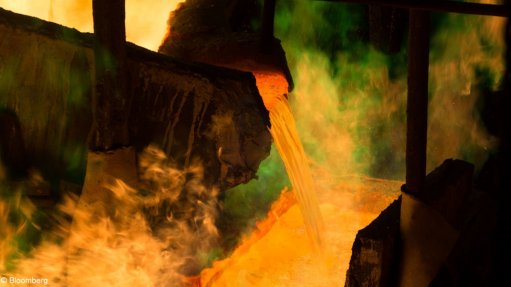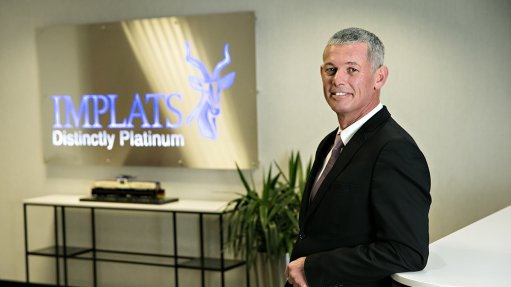Study investigates novel zinc refining method


SIMON NORTON The research endeavours to pioneer the latest techniques for powering various stages of the zinc refining process
Researchers at the University of Cape Town (UCT) are leading a concept study aimed at developing a mini-scale, environment-friendly process to extract pure zinc from polymetallic South African ore concentrates.
Spearheaded by UCT Department of Chemical Engineering Professor Jochen Petersen, the study seeks to address several critical challenges faced by the zinc industry, while embracing innovation and sustainability.
Manufacturer Duferco Steel Processing, from Saldanha Bay, is assisting to fund the zinc refining project, including providing funding for ongoing postgraduate research to ultimately benefit zinc end-users.
Duferco is also a supporter of the environmentally friendly zinc refining research at UCT. This commitment stems from their significant use of zinc and recognition of the imperative to foster knowledge and intellectual assets in South Africa.
The study also seeks, as a central objective, the development of an innovative, environment-friendly method to recover pure zinc from South African zinc sulfide ore, with the overarching goal of contributing to sustainability within the industry.
Another goal is to explore novel process chemistry that effectively eliminates metallic contaminants from zinc ore, thereby elevating the quality of the final product.
The study encompasses a thorough investigation into the feasibility of establishing a special high grade zinc production facility, capable of producing 40 000 t/y.
Additionally, according to International Zinc Association (IZA) Africa executive director Simon Norton, the research endeavours to pioneer the latest techniques for powering various stages of the zinc refining process, aiming to enhance efficiency and potentially reshape conventional power provision approaches.
Norton explains the potential of the concept study lies in its ability to establish domestic capabilities for producing high-grade refined zinc, the significance of which is underscored by data received following the 2011 closure of the Johannesburg Zincor refinery – a time in which refined zinc cost R13 500/t.
However, the scenario had drastically changed by June this year, with a tonne of refined zinc now priced at R43 000.
“When accounting for import duties, freight charges and insurance costs incurred from distant suppliers in South Korea or Kazakhstan where South African traders procure refined zinc, the total cost escalates to an exorbitant level.
“In the current market conditions, this translates to an annual cost exceeding R3.5-billion for the South African industry, solely considering the London Metal Exchange price of refined zinc,” Norton explains.
Adding to the economic climate are recent events, such as Russia’s invasion of Ukraine in early 2022, coupled with punitive carbon dioxide emission taxes imposed on zinc refineries by the European Union (EU).
This resulted in the closure, or significant production reduction, of four zinc refineries in Europe, and prompted the EU to turn to the sources from which South African businesses import zinc, thereby further elevating prices for South African consumers.
In this context, the establishment of an environmentally sustainable and energy-efficient zinc refinery within South Africa, synergising with the country's substantial local zinc ore reserves, holds immense promise, Norton emphasises.
“With yearly demand ranging from 77 000 t to 86 000 t of refined zinc, domestic industries stand to achieve substantial cost savings,” he comments, adding that the country will attain a degree of independence from the logistical complexities and uncertainties associated with distant supply chains originating in Kazakhstan and South Korea.
Leaching Innovation
The UCT study's focus will shift to analysing data from leaching experiments, which will provide insights into operational conditions and potential efficiencies of the ammonia-based leaching process.
Simultaneously, a preliminary process flowsheet will be formulated, along with a cost evaluation for operating the process at a 40 000 t/y zinc production facility.
These outcomes will determine whether further development of the proposed process for industrial application is feasible, and which process aspects might need additional technological refinement. Although ammonia-based base metal processing is established, its application in zinc refining is novel.
An ammonia-based leaching process as a potential choice for zinc refining, will enable the removal of iron and manganese from South African ore.
The leach experiments will try to determine if the ammonia chemistry will achieve increased extraction of zinc while rejecting the manganese and iron. The process and leaching tests will be used to create varying conditions and thus determine the best process operating parameters, Norton says, adding that this laboratory bench scale work will guide the determination of the final process which will be used in the pilot plant.
Should the research and pilot plant demonstrate the feasibility and cost-effectiveness of a clean, green, and energy-efficient zinc refining process, it could attract significant interest from venture capitalists to establish such a plant in South Africa.
The suitable zinc concentrate sample used in the study was sourced through diversified natural resources company Vedanta Resources’ Black Mountain operation in the Aggeneys region of South Africa’s Northern Cape province.
Vedanta South Africa is a member of IZA and also owns and operates a zinc refinery in southern Namibia – Skorpion. This refinery had to cease operations in early 2020 owing to its exclusive design for processing zinc oxide ore from Namibia, which Vedanta had depleted in its Namibian resources.
However, Vedanta continues to manage the Gamsberg zinc mine, not far from the Black Mountain mine. The Black Mountain repository proved to be an ideal source for investigative research processes.
The miner has also provided locally mined zinc ore for process evaluation.
Comments
Press Office
Announcements
What's On
Subscribe to improve your user experience...
Option 1 (equivalent of R125 a month):
Receive a weekly copy of Creamer Media's Engineering News & Mining Weekly magazine
(print copy for those in South Africa and e-magazine for those outside of South Africa)
Receive daily email newsletters
Access to full search results
Access archive of magazine back copies
Access to Projects in Progress
Access to ONE Research Report of your choice in PDF format
Option 2 (equivalent of R375 a month):
All benefits from Option 1
PLUS
Access to Creamer Media's Research Channel Africa for ALL Research Reports, in PDF format, on various industrial and mining sectors
including Electricity; Water; Energy Transition; Hydrogen; Roads, Rail and Ports; Coal; Gold; Platinum; Battery Metals; etc.
Already a subscriber?
Forgotten your password?
Receive weekly copy of Creamer Media's Engineering News & Mining Weekly magazine (print copy for those in South Africa and e-magazine for those outside of South Africa)
➕
Recieve daily email newsletters
➕
Access to full search results
➕
Access archive of magazine back copies
➕
Access to Projects in Progress
➕
Access to ONE Research Report of your choice in PDF format
RESEARCH CHANNEL AFRICA
R4500 (equivalent of R375 a month)
SUBSCRIBEAll benefits from Option 1
➕
Access to Creamer Media's Research Channel Africa for ALL Research Reports on various industrial and mining sectors, in PDF format, including on:
Electricity
➕
Water
➕
Energy Transition
➕
Hydrogen
➕
Roads, Rail and Ports
➕
Coal
➕
Gold
➕
Platinum
➕
Battery Metals
➕
etc.
Receive all benefits from Option 1 or Option 2 delivered to numerous people at your company
➕
Multiple User names and Passwords for simultaneous log-ins
➕
Intranet integration access to all in your organisation



















